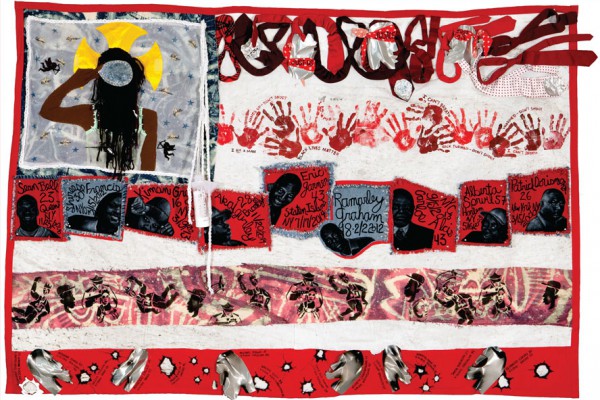Descripción de la Exposición
Born in Culiacán, Mexico, Teresa Margolles is an artist working with photography, video, sculpture, and performance. She has spent the last two decades exploring socio-political issues related to violent death in Mexico, engaging the sense of loss and sorrow that each assassination leaves on the victim’s family, friends, and community.
Teresa Margolles: We Have a Common Thread expands on the artist’s long exploration of violence through a series of new works involving the unprecedented participation of artist-embroiderers from Panama, Nicaragua, Guatemala, Brazil, Mexico, and the United States, all of whom share her concerns about violence, particularly against women. After explaining her vision for the project, Margolles provided each group with a fabric that had been marked through contact with the body of a woman, or in some cases a man, who had suffered a violent death. She invited the embroiderers to create patterns on the fabric as a way to trigger a conversation about the violence and social problems plaguing their respective communities. Some of these conversations were recorded and are included here in a series of videos providing context for the textiles.
The works presented in this exhibition express in a collective voice the challenges faced by each community. The textile from Guatemala memorializes the sorrows and struggles of Mayan women living on the shores of Lake Atitlan. Focusing on domestic and social violence, the embroiderers condemn the sexual abuses and murders that mark their lives, and the impunity that surrounds the perpetrators. The work created in Mexico by Rarámuri (Tarahumara) living on the outskirts of Ciudad Juarez evokes the stigmatization of native women because of the way they dress and the language they speak. The embroiderers also describe the assassinations of Rarámuri living in the mountains, and the subsequent cover-up by authorities who claim that the victims had committed suicide due to hunger. The textile created in Brazil recalls the cold-blooded murder of a woman in Recife, and the fact that someone can die in total anonymity—as if she or he had never existed—due to the inflexibility of a government bureaucracy that refuses to help the citizens. The work from Panama records a similar situation, in which a native Kuna boy was brutally murdered in enigmatic circumstances. Because the family lived away from their native village the boy could never receive a traditional Kuna burial. Recalling the disastrous effect of the Contra war in Nicaragua in the 1980s, when everyone was considered a Sandinista, the work of embroiders from Managua recalls the entire generation that continues to suffer from alcoholism, drug addiction, and a circle of daily violence. Finally, the textile recently completed in Harlem, New York City, expresses the artists’ concerns regarding the police brutality affecting the African-American community today, and the increasing number of deaths that result from it. The work was created on a fabric imprinted by the spot on Staten Island where Eric Garner died while being placed under arrest, a subject of intense debate in the U.S. Like the rest of the works, this textile expresses the artist-embroiders’ search for justice and a hope for better social conditions in their community.
Teresa Margolles: We Have a Common Thread is organized by the Neuberger Museum of Art, Purchase College, SUNY, and curated by Patrice Giasson, the Alex Gordon Associate Curator of the Art of the Americas.
Generous support for Teresa Margolles: We Have a Common Thread has been provided by the Alex Gordon Estate. Additional support has been provided by the Friends of the Neuberger Museum of Art and by the Purchase College Foundation.

Exposición. 19 ene de 2017 - 01 may de 2017 / El Paso Museum of Art (EPMA) / El Paso, Texas, Estados Unidos

Exposición. 13 sep de 2016 - 11 dic de 2016 / Colby Museum of Art / Waterville, Maine, Estados Unidos

Formación. 08 may de 2025 - 17 may de 2025 / Museo Nacional Centro de Arte Reina Sofía (MNCARS) / Madrid, España